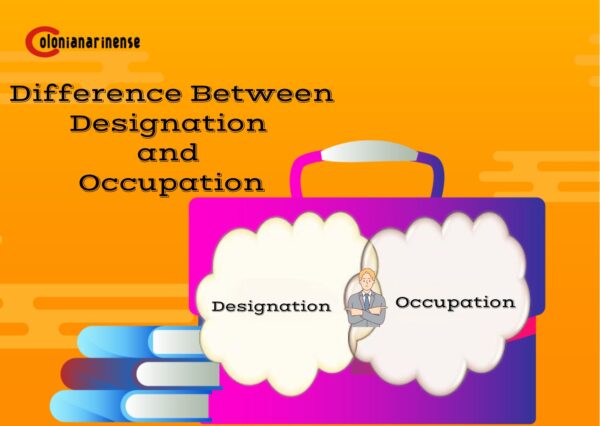If you’re navigating the job market or already working, you might find yourself confused about the difference between “designation” and “occupation.” They may sound similar, but they refer to different things. Let’s clear it up by breaking down what each term means and how they differ. Ready? Let’s dive in and unpack the key differences between designation and occupation.
What is Occupation?
Occupation refers to the general type of work you do to earn a living. It’s the broad category that describes your field or industry. Think of it as the umbrella that covers various job roles within a specific field. For example, if someone says they’re in education, they could be a teacher, school administrator, or university lecturer—it doesn’t specify the exact tasks they perform daily. Occupations often require certain qualifications, such as education, specialized training, or certifications.
What is Designation?
Designation, on the other hand, is much more specific. It refers to your exact job title or position within an organization. It shows your rank or role in the company, highlighting your responsibilities and expertise. Designations can vary from one company to another, even if the job duties are similar. For instance, in the tech world, you might have titles like “Software Developer,” “Systems Analyst,” or “IT Project Manager,” depending on the specifics of your role.
Key Differences Between Designation and Occupation:
| Aspect | Designation | Occupation |
|---|---|---|
| Definition | A specific job title indicating your role in an organization. | The broad field or type of work you do to earn a living. |
| Scope | Usually linked to formal positions within an organization. | Encompasses a wide range of job types, both within and outside organizations. |
| Formality | Often formalized within organizational structures, based on job roles. | Can be formal or informal, depending on the field and context. |
| Stability | Can change due to promotions, restructuring, or shifts in job roles. | Generally stable, though career shifts or skill development may lead to changes. |
| Examples | Manager, Engineer, Director | Teacher, Accountant, Carpenter |
| Importance | Crucial for understanding organizational hierarchy and job responsibilities. | Helps identify the type of work you do and your professional skill set. |
| Recognition | Typically recognized within an organization and may affect pay and status. | Recognized for the skills and expertise required in your field. |
| Flexibility | Varies widely across industries and organizations. | More adaptable, allowing for transitions across similar fields. |
| Formalization | Standardized within companies, with clear criteria for titles. | May vary, with different classifications across industries. |
| Social Status | Can reflect your level within a company’s hierarchy. | May carry societal recognition, depending on the profession. |
1. What’s the Difference?
When we compare occupation and designation, it’s like comparing a general field of work to your specific role within that field. Occupation is broader, like being in education, healthcare, or engineering. Designation, on the other hand, narrows it down to your specific job title—what you tell someone when they ask, “What do you do?” For example, you wouldn’t just say “teacher” but rather “high school biology teacher” or “university lecturer.”
2. Flexibility and Transferability
Occupations often offer more flexibility. The skills you acquire in one job can be transferred to a similar role in a different company or even a different field. Designations, however, may not be as flexible. Even if you switch jobs within the same field, your title might change depending on the company’s hierarchy or job structure.
3. Professional Growth and Career Ladder
Designations are more about climbing the career ladder within a specific company or industry. As you gain experience and responsibility, your title changes—moving from an entry-level position to a senior or managerial role. Occupations focus on improving your expertise in a particular field. You might not get a title change, but your skills and knowledge in your field will expand, and you’ll become more proficient at what you do.
4. Education and Skill Requirements
To enter any occupation, you usually need a certain level of education or certification. This is often standard across industries. Designations, however, can vary significantly. Some job titles may require a high level of education, while others might be earned through years of experience on the job.
5. Salary and Job Market
Both occupation and designation play a role in determining your salary and job prospects. Occupation gives you an idea of which fields are in demand and how well they pay, while your designation shows your specific earning potential within that field. Higher-level designations usually come with a bigger paycheck, reflecting the added responsibility and expertise.
6. Perception and Social Status
Both occupation and designation can affect how people perceive you. Occupations like doctors, lawyers, or engineers are often held in high regard due to the education and skills required. Designations, like “Chief Executive Officer” or “Director,” can also carry social status, indicating a person’s success and influence within their organization.
Conclusion
So, there you have it! If you’ve been reading from the start, you should now have a clear understanding of the difference between designation and occupation. While they both describe what you do for a living, occupation is the broader category, and designation is your specific role within that category. By knowing the difference, you’ll be better prepared to navigate your career and communicate your professional identity more effectively.



